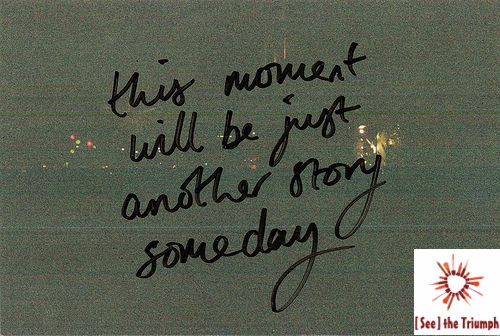|
By Allison Crowe, See the Triumph Co-Founder
When is it the “right” time to start telling your story as a survivor of intimate partner violence? For the month of August, Christine and I wanted to focus on the idea that every survivor has a story worth sharing. Stories are powerful. They heal us when we tell painful ones. They bring us happiness when we re-live the joyful ones. But for some stories, timing is especially important, and knowing when you are ready to begin telling that story is a unique and personal decision for you. This is certainly the case when it comes to sharing your own abuse story. A few years ago, when I was doing clinical work in a group practice setting, I had a client who was a survivor of years of childhood sexual abuse. She had just been transferred to me after working very successfully with a clinical intern who was moving to another state. “Connie” (name changed for anonymity) was extremely shy, suffering from serious symptoms of PTSD, and had just begun the process of working full time again and beginning a new life as a young woman. Her previous therapist helped her heal slowly but surely, as she worked through her abuse history. When hearing about the amazing transformation that had already taken place in a little over a year, I was intimidated about coming on as her counselor since they had accomplished so much together. I was also very sensitive to the notion that Connie might need some time before she even wanted to entertain the idea of sharing her story with me. For about a month or so, when Connie and I met for our therapy sessions, we did not delve into the abuse. I knew Connie wasn’t ready yet. Instead we talked about music, her work, her friends in the area, and how she was coping with PTSD symptoms. After some time, with a strong therapeutic relationship in place, I think she felt safe enough with me to tell me the parts of the story she still needed to talk through. She did not have to rehash her entire story to me in every detail, though. Really, I let her share what she wanted to share, and continued to check in about how she was feeling about our work together to make sure she always felt as though she was benefiting from retelling her story. Now, my time with Connie is just one example of stories, and how they have touched me as a clinician. Based on this experience, I can say the following to you out there who might be thinking about whether it’s time to seek out a counselor or therapist to share your story with.
These are just a few ideas for telling your story. Deciding to begin the process while having a “safety net” of a counselor or therapist can be one of the best ways to begin your healing process. And as a therapist, I know how grateful I feel to have been a part of the healing process for women and men who are overcoming their own abuse histories. It’s humbling to be trusted in this sort of way, and I’m thankful all the time to have shared in so many journeys. Thanks to all of you who choose to share your stories and Connie if you’re out there, a special thanks to you for sharing with me. Comments are closed.
|
Archives
July 2024
CategoriesAll About Intimate Partner Violence About Intimate Partner Violence Advocacy Ambassadors Children Churches College Campuses Cultural Issues Domestic Violence Awareness Month Financial Recovery How To Help A Friend Human Rights Human-rights Immigrants International Media Overcoming Past Abuse Overcoming-past-abuse Parenting Prevention Resources For Survivors Safe Relationships Following Abuse Schools Selfcare Self-care Sexual Assault Sexuality Social Justice Social-justice Stigma Supporting Survivors Survivor Quotes Survivor-quotes Survivor Stories Teen Dating Violence Trafficking Transformative-approaches |
Search by typing & pressing enter



 RSS Feed
RSS Feed